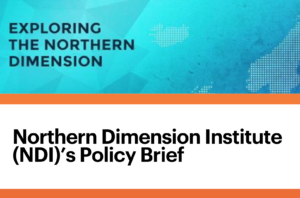Northern Dimension Institute Policy Brief: “Symbolic resources of the Russian North in the global experience economy”

This Policy Brief gives recommendations for the development of cultural products and creative entrepreneurship in the Russian North through the conceptual lenses of symbolic resources and the experience economy.
The global experience economy has changed the value chain logic of the cultural market from the traditional production and consumption of creative products and services to the co-creation of cultural experiences. This co-creation implies that symbolic resources, such as the cultural heritage, are interpreted in a novel way that transforms them into experiences connected to time and place. Cultural projects, which started in the Russian North-West in the late 1990s and follow the logic of the experience economy, have proved their sustainability on the regional and global cultural scenes. Their success is explained by common features of the artistic content and organizational models. These features include the artistic interpretation of Northern cultural symbols and the formation of comfortable spaces for creative interaction of actors with different backgrounds.
The Policy Brief gives the following recommendations:
Recommendation 1.
New visions of the Northern Russian heritage as the valuable resource for cultural innovation should be promoted and supported in the spheres of service design, creative tourism and event management.
Recommendation 2.
Creative places in the Russian North that host experimental art activities and traditional cultural and commercial events need to be promoted as powerful territorial brands.
Recommendation 3.
Applied research on management and organizational issues of the “unorthodox” cultural products development and on the implementation of hybrid symbolic meanings to the traditional landscapes will help to share the best practices of cultural entrepreneurship.
The Policy Brief can be downloaded here.
For more information, please contact the author:
Anna Soloveva, professor at the World History Department, Northern Arctic Federal University, Arkhangelsk, Russia, a.soloveva[at]narfu.ru
